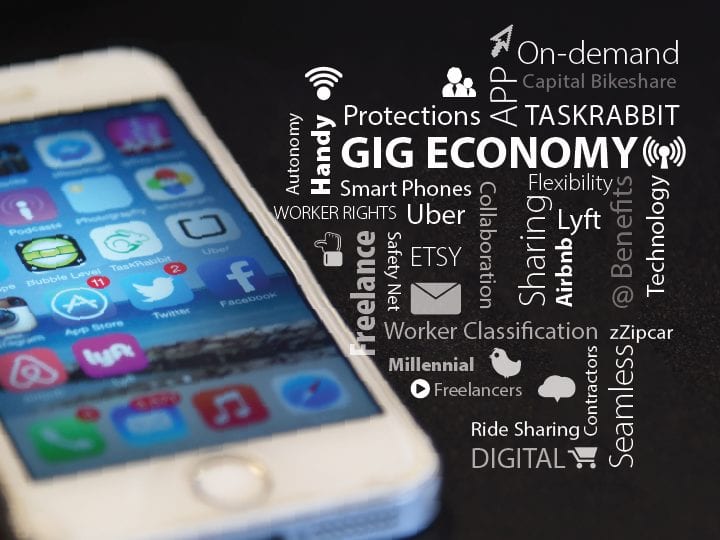Trending Now
Times are tough out there, and even though the economy is in goodish shape for now, a lot of people still have to hustle with two or three jobs and side gigs.
The “gig economy” that so many people are now a part of (Uber, Airbnb, etc.) does provide Americans some extra cash, but it’s also had unexpected negative impacts, too. There is some pretty shady stuff going on out there in the gig economy – stuff that wouldn’t be able to go down without it. Here are 5 examples of the gig economy’s unintended consequences getting messy:
1. People can unknowingly confess to crimes they didn’t commit.
This is a very strange story, but it’s emblematic of how the gig economy can turn sour in an instant.
Everybody wants to make extra money, and a woman named Samantha Field thought she was simply adding to her acting resume when she took a paid job reading a script in front of a camera.
Field got the job, which paid her a measly $35, through the website Fiverr in 2017 and was under the impression that the monologue she would read on camera was from a soon-to-be-released novel called The Floppy Hat. Field read the script, which was about fake anthrax attacks in Saskatoon, Saskatchewan, Canada, on camera and collected her paycheck.

Photo Credit: YouTube
What Field didn’t realize was that the person who hired her, Alexa Emerson, had carried out actual fake anthrax attacks and concocted a plan. She wrote a detailed confession to the crimes, hired Field to read the script on camera, and then sent the video to police and the media. Field was shocked to learn she was wanted for questioning by police. The cops questioned Field, but never considered her to be a serious suspect because they thought her performance in the video was “clearly scripted.”
Weird, right?
2. Your house or apartment can be rented out without you knowing it.
Airbnb is great and gives travelers a myriad of options when visiting a city. BUT, stories like the one I’m about to tell you prove that it can backfire in a big way, too. A couple from San Francisco were heading to Burning Man (woo!) when some friends called to tell them that they (the friends) were renting their (the Burning Man couple’s) apartment. The friends only realized that they knew the owners when they recognized their pictures on the wall. How random is that?

Photo Credit: Unsplash,Ale kon
The vacationing couple had hired a pet sitter from a site called Trusted Housesitters. It turns out, the sitter was listing the homes and apartments he was hired to petsit at on Airbnb so he could make double the money.
What a creep!
There are also stories out there of people renting out Airbnbs long-term and then listing the places on Craigslist and taking deposits from potential renters who believe that person owns the property. When the original owners return, they are bombarded with people who think they’ve just rented a new place to live. So rude!
3. Squatter’s rights can be a huge headache.
Also known as “adverse possession,” squatter’s rights are put into use when a person refuses to leave a property they’ve occupied for a while (i.e. not the owner). A college professor in California rented out her home on a website called Sabbatical Homes, a kind of Airbnb for academics, while she took an extended research trip to France. The renter was a fellow professor at a different university, so the woman assumed her house would be in good hands.
When she returned from France five months later, her furniture and many of her belongings were gone and the renter refused to leave. He claimed squatter’s rights because of the length of the professor’s absence. It took an entire year before the professor was able to reclaim her home from the asshat.
Landlord beware.
4. Ridesharing is messing up traffic plans.
Uber, Lyft, and other ridesharing services have changed the game in many ways and are incredibly convenient, but they have had some extremely negative effects as well – and no place has been hit harder than New York City, the most populous city in America. NYC Taxi drivers must purchase a medallion to operate their cabs, and these babies used to be an extremely good investment – before the rise of Uber, a medallion could easily cost $1 million (although this was also driven by a speculative bubble of medallion investors who artificially inflated prices to make money). The city only ever issued a certain number of medallions, which was intended to keep traffic down.

Photo Credit: Unsplash, Dan Gold
With the influx of Uber and Lyft drivers, a taxi driver’s annual salary has dropped nearly $20,000 and those medallions are being sold for much less because some of the city’s taxi drivers are getting out of the business forever. NYC taxi drivers have also recently started committing suicide at a startling rate.
Oh, and the traffic? It’s increased by 8% in the Big Apple since ridesharing apps became all the rage. So the already-congested streets of NYC are even more crowded now. Travis Bickle would not be happy.

Photo Credit: Columbia Pictures
5. Crowdsourced charities can take away from real ones.
Are you constantly bombarded online by people asking you to donate to this cause or that? It all sounds good in theory, but how do you know if your money is really going to the right place?
Charitable organizations have a complicated enough process of getting money and goods to the people who need them, and throwing crowdsourced charities into the mix makes it even harder, opening up the door to scammers of all shapes and sizes.

Photo Credit: Pixabay
And while it may seem like donating to a specific person or a small, crowdsourced (i.e. unverified) charity is the better idea – maybe it just cuts out all the red tape and middlemen! – you’re much better off donating to an established charity that has the rules and regulations in place to assure the money gets where it needs to go.
Man, people are sketchy.






